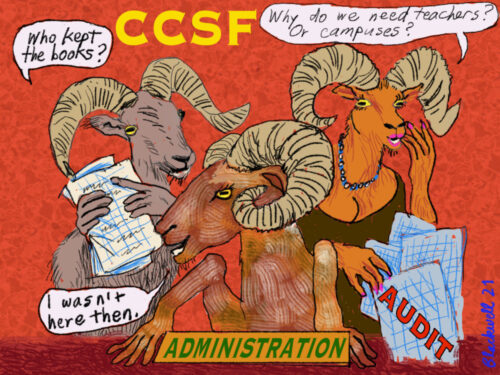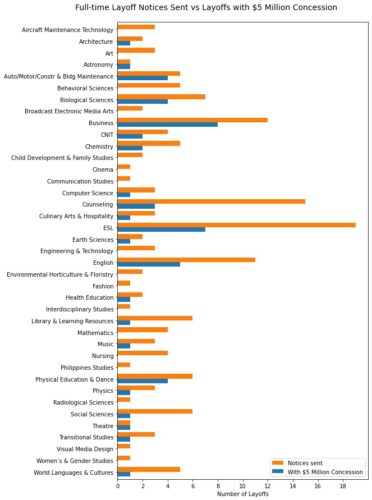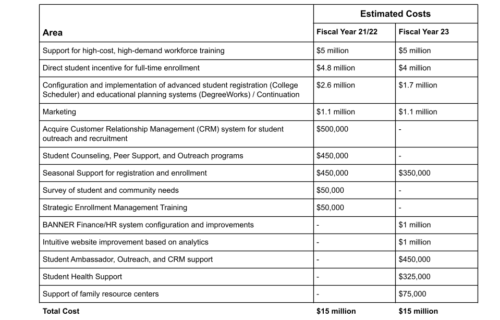Administration Asks City for $30 Million in Emergency Aid
By Annette Mullaney
annette.mullaney@gmail.com
With deadlines for layoffs looming, Interim Chancellor Rajen Vurdien announced that City College has submitted a request for $30 million to City Hall, and revealed an untapped source of up to $10 million a year as part of the college’s ongoing efforts to address its $33 million budget deficit.
According to Vurdien at the April 22 Chancellor’s Forum, the city’s Free City program currently pays up to $10 million for students who qualify for federal and state aid but don’t apply. That money, already earmarked by the city for the college, would be freed up if students filled out FAFSA.
The request asks San Francisco for $15 million a year for the next two years and could be introduced to the Board of Supervisors as early as April 27. The proposal includes $5 million to keep 500 sections of high-demand, high-cost classes related to workforce training serving 12,000 students, $4.8 million in direct enrollment incentives for students, and over $2.5 million in various other measures to increase enrollment.
However, even if passed, this package will not impact layoffs, according to City College Board of Trustees President Shanell Williams. “Negotiations are number one for determination over layoffs. This proposal will help in the long term to boost our enrollment,” she said.
Enrollment, a substantial factor in the state’s funding formula, has plummeted at City College over the last decade. At its height, in AY 2008-09, there were over 100,000 students. Ten years later, there were just over 65,000 students, with enrollment declining even more during the pandemic.
A report by the state’s Financial Crisis and Management Assistance Team earlier this month underscored the severity of City College’s financial crisis. The report, made public by the Chronicle, says structural deficit spending, stemming from “excess staffing, excess learning sites, and lack of internal controls,” raised “substantial doubt about [the college’s] ability to continue.”

Under the five-year budget plan adopted by the Board of Trustees in November to address the deficit, courses will be cut by 20% for credit classes and 24% for noncredit. Layoffs of 163 full-time faculty, which the union calculates would also mean layoffs for 477 part-timers, will take effect May 15 if additional funding or concessions with the faculty union AFT2121 are not reached.
All-day hearings, in which faculty can contest their layoff notices on procedural grounds, began Monday April 23 with closing arguments expected April 27. According to AFT2121 President Malaika Finkelstein, six layoffs were dismissed out of hand. For others, the presiding judge will make recommendations, with ultimate decisions falling to the City College Board of Trustees at a special board meeting on May 10.
Meanwhile, negotiations continue. AFT2121 Vice President Mary Bravewoman said that while an official offer has not been made, the administration has been discussing reducing the number of full-time layoffs to 52 in exchange for $5 million in salary concessions. The union calculated that under this scheme there would also be 269 part-time layoffs.
“They need faculty to give up $20 million. How that happens doesn’t really matter,” Bravewoman said. “Our position is that really there has to be a better way.”
The City College administration did not respond to requests for comments.

Students and faculty have been protesting layoffs and class cuts for months. They have also lobbied the city for emergency funding, culminating in an April 9 hearing before the Youth, Young Adult, and Families Committee, and are running campaigns urging people to voice their support for City College.
“The state of California is not providing for the college that the city needs. San Francisco deserves a real community college,” Finkelstein said.
“There’s clearly a need for immediate financial support for City College to avert the widespread layoffs and resultant reductions in classes and programs,” said District 4 Supervisor Gordon Mar, who has been in talks with senior administrators, trustees, and the union about securing funding.
Bravewoman said the union and supervisors including Mar have discussed city funding of up to $30-40 million a year over the next couple of years, but could go as low as $10 million in an attempt to secure wider support.
Mar and District 9 Supervisor Hilary Ronen also invited City College administrators, Williams, Vice President Tom Temprano, and Trustee Thea Selby to an April 15 meeting to discuss securing city funds for the college. Based on that discussion, City College administrators formulated the $10 million request.
The city has approved emergency funding for the college previously. In late 2019, then-Chancellor Mark Rocha rejected $2.4 million from the Board of Supervisors to restore cut classes. Last year Mar spearheaded the creation of the Workforce Education and Recovery Fund (WERF). Originally slated to provide $20 million per year, the fund was scaled back considerably during the pandemic, providing $200,000 for Spring 2021.

Almost all parties emphasized the need for longer term support to address the college’s structural budget deficit. Mar cited the Public Education Enrichment Fund (PEEF), approved by San Francisco voters in 2004, which currently provides over $70 million yearly to the San Francisco Unified School District, as a possible template for sustained city funding. Establishing a similar fund for city college would require a city ballot measure, which Mar said he is working on bringing to the voters in 2022.
“I think all of my colleagues recognize the importance of City College,” said Mar, but added, “city government is facing financial challenges and its own deficit.”
“We’re going to need all or at least a supermajority of the Board of Supervisors to support it,” Mar said. “I would encourage people to reach out to their district supervisor.”
Williams agreed that people should contact their supervisors. “Now is the time to support City College.” she said. “We are an anchor institution in the city of San Francisco.”

Is the decline also partially related to the non-repeatability changes for classes? How does it relate to funding changes related to adult schools in the state?
It seems like the state emphasizes funding for certificate and degree completion. When many SF residents take classes outside these bounds, the state funding is not realistic. When classes are smaller (which is better pedagogy), state funding cannot cover this. It is important that SF fund the kind of higher ed it wants – one where students can take what they need outside of a ‘completion’ path, perhaps as smaller classes, and one that honors a non-traditional path.